UP Law Center Workers And Employees Program (WEP) Holds 2nd Online Roundtable Discussion With Various Labor Groups
The Workers and Employees Program (WEP) of the University of the Philippines Law Center conducted its 2nd Online Round Table Discussion (RTD) last November 20, 2021 which focused on the theme – – “Identifying the Most Pressing Labor Issues for the 18th Congress”. The event was attended by representatives from labor unions and federations, labor-related organizations, and government agencies, a Sectoral Representative, policy experts, labor practitioners, academics, and law students.
The RTD was formally opened by UP College of Law Associate Dean, Professor Solomon F. Lumba who delivered the Welcome Remarks. He expressed appreciation for the Members and staff of WEP who made the event possible, along with the distinguished participants.
This was followed by a recap of the 1st online RTD which was held last October 23, 2021 and the setting of expectations for this 2nd RTD by WEP Program Director, Professor Patricia R.P. Salvador Daway. Recalling the vision, mission, and goals of WEP, she highlighted the focus on five priority bills as well as the various concerns that were raised by distinguished participants during the 1st RTD.
Prof. Daway, then, presented the objectives of the 2nd RTD, namely: (1) to present proposed legislative measures, consideration of which may prosper in this 18th Congress, (2) to identify the gaps in existing legislations and policies, and (3) formulate proposals and points of action to address said gaps. Given time constraints, she stressed that the 2nd RTD would focus on three priority bills which are: (1) the bills proposing the creation of the Department of Migrant Workers and Overseas Filipinos, (2) the Calamity Leave Act, and (3) the Security of Tenure and End of Endo Act and that hereafter, there will be a plenary session that will provide an opportunity for all participants to react to the presentations and raise their related concerns.
Prof. Evelyn (Leo) D. Battad presented the position paper of the WEP on the two bills creating the Department of Overseas FIlipinos, House Bill No. 5832 and Senate Bill No. 2234. She explained that WEP is strongly opposing the passage of the bill, citing several reasons: (1) the creation of such a department will be unnecessary and unresponsive to the plight of overseas and local workers and the long-term development of the country; (2) the establishment of the department only continues to institutionalize a stopgap measure to address the increasing unemployment and underemployment from the 70s and 80s; (3) it perpetuates and rationalizes the overdependence of the Philippine government on OFWs as drivers of economic growth; (4) the bill reinforces the thrust of past and present administrations to export labor as a major means to spur economic growth and development; and (5) the budget and resources for the creation of said department could be better devoted to providing work opportunities and ensuring security of tenure and providing other support services to workers, farmers, informal workers, and small entrepreneurs.
She explained that WEP urges lawmakers to instead consider other legislative measures such as providing employment opportunities for workers through national industrialization and genuine agrarian reform, addressing concerns on health and unemployment benefits in the time of COVID-19, and ending contractualization by ensuring and protecting the security of tenure of all workers.
The bills identified by WEP as representing the most pressing labor issues for the 18th Congress were presented by Atty. Emir V. Mendoza. These bills are House Bill Nos. 5586, 5775, and 8847 and Senate Bill 1123 which all provide a calamity leave in both the public and private sectors and House Bill No. 7036 and Senate Bill No. 806 which deal with security of tenure and endo.
Atty. Emir noted the similarities between the house and senate bills for the Calamity Leave act, particularly the applicability of both bills on who is entitled to calamity leave, when calamity leave is available, and the non-diminution of benefits when such leave is availed of. For the Security of Tenure and End of Endo Act, Atty. Emir also noted the similarity between the two bills and highlighted several features in the senate bill that was not in the house bill, such as: how determination of direct relation of the service, job, or work to the business is left to appropriate bodies such as the industry tripartite council, or the secretary of labor and employment in the absence of the former with regard to labor-only contracting; workers are deemed regular employees retroactive when they were first deployed if labor-only contracting is present; compliance orders, when executory and how workers cannot be terminated pending appeal of a directive by the compliance order to regularize employees; and the power of the Secretary of Labor to issue a fine and to close operations of labor-only contractors.
Prof. Marwil N. Llasos then introduced the participants preparatory to the plenary session. Labor organizations that participated included the Federation of Free Workers, Philippine Metalworkers’ Alliance, ALU-TUCP, TUCP Labor Center, Alliance of Health Workers, NAFLU-KMU, and the National Union of Bank Employees. Participating labor-related organizations included SALIGAN, Pag-aalay ng Puso Foundation, the Institute for Occupational Safety and Health Development, the Crispin B. Beltran Resource Center, and the Center for Trade Union and Human Rights. Representative Ferdinand Gaite of Bayan Muna was also in attendance. Representatives from the Department of Labor and Employment and the Philippine Overseas Employment Administration also participated on behalf of the government.
The plenary session was once again moderated by Prof. Arnold F. De Vera. Several issues were raised on the bills presented by WEP. For the bills creating the department of overseas Filipinos, a comment was presented acknowledging that the present situation has indeed made permanent what was intended to be a temporary program which resulted in overdependence on migrant workers. It was also raised that there is a need for the rationalization of agencies, ethical recruitment, and the need to address the needs of the ten million overseas FIlipino workers (OFWs). For the calamity leave bills, a proposal was made to marry the said bills with the pandemic leave bills, particularly to accommodate workers who are close contacts of infected individuals who need to undergo quarantine. Lastly, on the issue of contractualization, the consensus was that it has to end and that we should be guided by the Constitutional mandate to afford full protection to labor in defining the categories of employees under the Labor Code.
Prof Daway then informed the participants that WEP plans to conduct a series of focused group discussions on priority bills on a bi-monthly basis for the year 2022 and that in the December 2021 WEP Planning Meetings, the Members will be guided by specific concerns which have been raised in the 1st and 2nd RTDs as well as such labor-related concerns which WEP considers pressing issues at this most difficult time.
After the plenary session, the roundtable discussion was concluded with a synthesis of all the issues and concerns raised followed by a closing remarks from Prof. Marwil who thanked the participants on behalf of WEP.

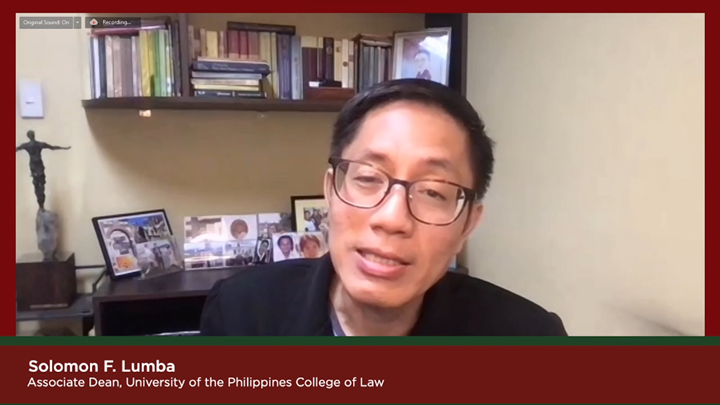
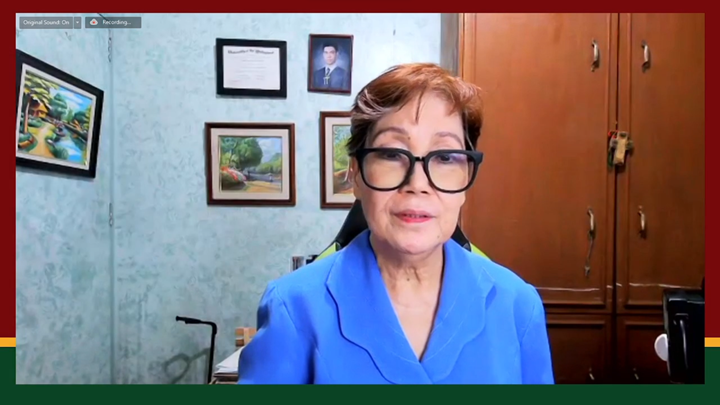
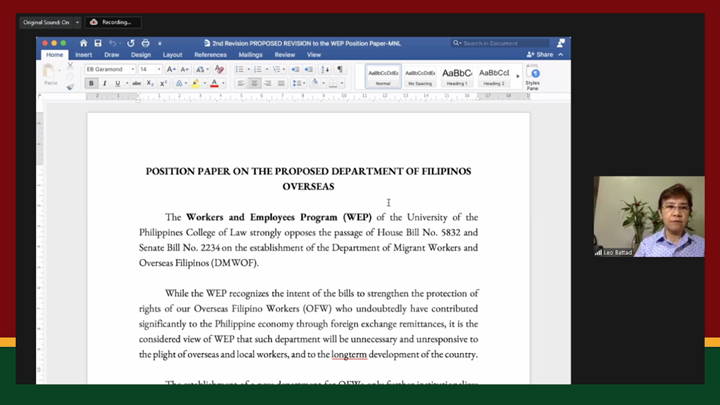
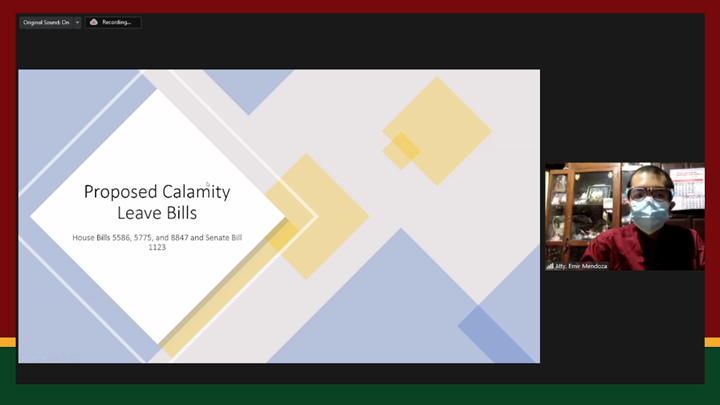
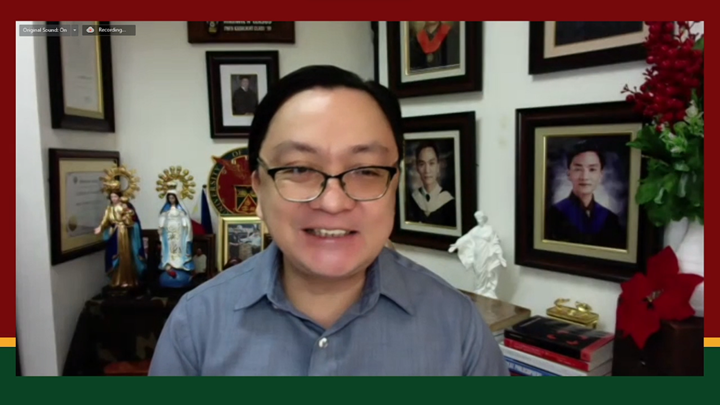
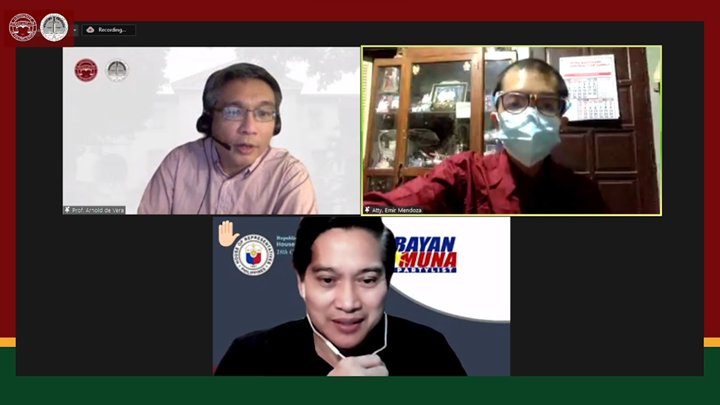
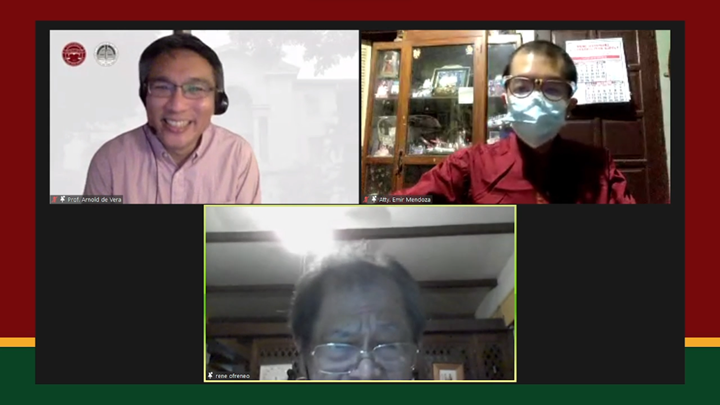






































































































 on the upper right corner to select a video.
on the upper right corner to select a video.